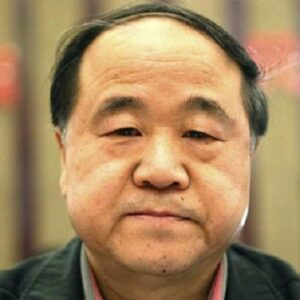Guan Moye (in the literary world, known as Mo Yan) is a Chinese novelist and short-story writer. He is a multidimensional novelist whose work defies easy categorization. His route to a literary career was not clear-cut because he was born and raised in a humble agricultural family, and his achievements are solely based on his talent. His inventive and humanistic fiction, which became popular in the 1980s, is well-known. Many writers’ influences can be seen in his writing style. Mo Yan’s writings span a wide range of genres, including short tales, novels, and essays. He frequently starts with older Chinese literature and popular oral traditions, merging them with present societal challenges. The epic novel ‘Red Sorghum’ was his international breakthrough. The ‘2012 Nobel Prize in Literature’ was given to him. Many of his writings have also been made into films around the world.
Childhood and Adolescence
Guan Moye was born on March 5, 1955, and grew up in a poor farming family in Gaomi, Shandong Province, north-eastern China.
During the Cultural Revolution, he dropped out of a primary school in his hometown in the fifth grade.
He worked on farms for several years before starting work in a cotton plant in 1973.
In 1976, he joined the People’s Liberation Army (PLA).
His creative career began with short stories in 1981. This is when he started using the pen name ‘Mo Yan,’ which means “Don’t Speak.”
Career of Mo Yan
He studied literature at the PLA Academy of Art from 1984 to 1986. He wrote stories like ‘Touming de hongluobo’ (Transparent Red Radish) and ‘Baozha’ at this time (Explosions). This was a watershed moment in his career as a writer.
He published the romantic historical story ‘Honggaoliang’ in 1986. (Red Sorghum). This story was published in ‘Honggaoliang jiazu’ in 1987, together with four other pieces (Red Sorghum Family).
He used a variety of styles in his later works, from myth to realism, satire to love stories, but his stories were always defined by an enthusiastic humanism.
In 1989, he published his novels ‘Tiantang suantai zhi ge’ (The Garlic Ballads) and ‘Shisan bu’ (Thirteen Steps).
‘Jiuguo’ (The Republic of Wine) was published in 1992 as a collection of short stories. In 1994, his novel “Shicao jiazu” (The Herbivorous Family) was published, followed by “Mo Yan wenji” (Collected Works of Mo Yan) in 1995.
His 1995 novel ‘Fengru feitun’ (Big Breasts and Wide Hips) sparked debate, both for its sexual nature and for failing to depict class struggle in the Chinese Communist Party’s preferred manner. The PLA pushed Mo to write a self-critique of the book and to pull it from circulation. However, there were still a lot of pirated versions of this book available.
In 1997, he resigned from the PLA as a result of this incident. Later, he worked as a newspaper editor and continued to write fiction, placing his adventures in his rural surroundings.
Under 2004, he wrote his novel ‘Tanxiangxing,’ which tells the tragedy of human cruelty in the disintegrating Empire. In 2013, this work was translated into English as ‘Sandalwood Death.’
In the 2006 novel ‘Shengsi pilao,’ black humour is used to characterize ordinary life in the young People’s Republic, as well as violent transformations. This novel was translated into English as ‘Life and Death are Wearing Me Out’ in 2008.
‘Shifu, You’ll Do Anything for a Laugh’ (‘Shifu, You’ll Do Anything for a Laugh’) is a compilation of eight stories from his latter works. The film ‘Happy Times’ is based on this novel. In 2000, the Valladolid International Picture Festival awarded this film the ‘Fipresci Prize’ and the ‘Silver Spike.’
In 2006, his work ‘Shengsi pilao’ was published in English as ‘Life and Death Are Wearing Me Out.’
His most recent novel, ‘Wa’ (English translation: ‘Frog,’ published in 2009, explores the implications of China’s single-child policy.
Another of Mo Yan’s short stories, ‘The White Dog and The Swing,’ was adapted into the 2003 film ‘Nuan.’ At the 16th Tokyo International Picture Festival in 2004, this film was awarded the ‘Grand Prix.’
Major Projects of Mo Yan
‘The Red Sorghum Family,’ released in 1987, is one of his most well-known works. This novel cemented his reputation as a writer. In 1987, it was adapted into a film of the same name. At the 1987 Berlin International Film Festival, the film earned the Golden Bear Award, the first major international honor given to a post-Mao Chinese film. The book is made up of five stories set in Gaomi during several stormy decades of the twentieth century, with depictions of bandit culture, Japanese occupation, and the hard working conditions of poor farm labourers. The magazine ‘World Literature Today’ named this novel one of the ‘Top 40’ in its first 75 years of publication, as well as the finest of 1987.
Achievements & Awards
In 1998, he was a finalist for the ‘Neustadt International Prize for Literature.’
In 2005, Mo Yan’s novel ‘Big Breasts and Wide Hips’ won the ‘Kiriyama Prize’ for significant literature.
In 2005, the Open University of Hong Kong awarded him a ‘Doctor of Letters’ degree.
In 2009, he was awarded the Newman Prize for Chinese Literature for his work ‘Life and Death Are Wearing Me Out.’
He was named a “Honorary Fellow” of the “Modern Language Association” in 2010.
In 2011, he received the ‘Mao Dun Literature Prize’ for his translated work ‘Frog.’
In 2012, he was awarded the highest literary accolade, the ‘Nobel Prize in Literature.’
Personal History and Legacy
In 1979, Mo Yan married Du Qinlan. Guan Xiaoxiao, their daughter, was born in 1981.
All of his commercial and public relations matters, including copyright challenges, are handled by his daughter.
Estimated Net Worth
This Chinese writer has a net worth of $25 million as of 2016.


